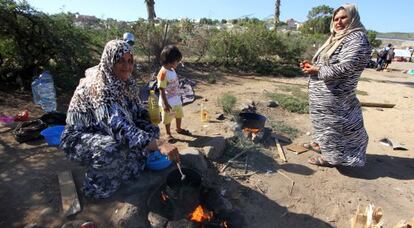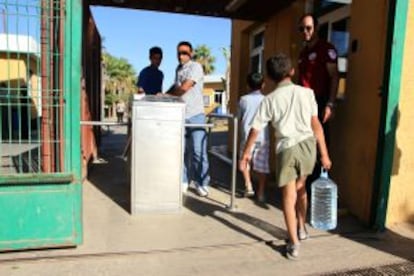Refugees caught up in Spain¡¯s red tape
Asylum seekers are held back by all the paperwork required to process their applications


Goodwill is not enough. Taking in refugees requires foresight and good planning.
In Brussels, negotiations over quotas keep dragging on, and Spain has yet to clearly define its plans to deal with the nearly 17,000 new refugees allocated to it by European authorities.
But in the meantime, red tape is slowing down the application process for thousands of asylum seekers who are already in Spain.
We are going to double our capacity for those who are already here, but if 15,000 more come, we will have to expand again¡±
Almudena Echevarr¨ªa, Spanish Red Cross refugee program
While these people wait for access to the national migrant support system, NGOs are doing their best to cover their basic needs with a subsidy package that recently received fast-track approval in parliament.
Non-profits have doubled the capacity of their centers in order to handle all the refugees who are already in Spain but living in precarious conditions, sometimes even out on the streets.
Little is known about the thousands of refugees who will be arriving in future. The government says it is waiting for the EU to organize the transfers, and that in the meantime it is working on an Integral Reception and Integration protocol, whose content authorities have not disclosed.
Eliminating bureaucratic hurdles
Unemployment remains one of the greatest challenges to refugee integration in Spain, authorities and NGOs agree. That is why many displaced persons choose to keep moving north in search of opportunities, making Spain a transit country.
During the boom years, many refugees were able to find jobs in construction within the six months allocated to them at migrant centers. But that is no longer the case. That is why non-profits are asking for fewer hurdles to getting refugees' professional and education degrees recognized in Spain, and streamlining access to vocational training.
Education Minister ??igo M¨¦ndez de Vigo recalled how a special degree equivalence system was created for the refugees from the former Yugoslavia.
"We need to foresee it, we need to plan so we don't get caught unprepared," he warned.
Marina del Corral, state secretary for immigration affairs, goes further in the need to eliminate barriers to integration. Existing regulations, she notes, establish that applicants to social aid need to be registered on a town's local rolls for a certain period of time, while landlords ask potential tenants for a job contract that refugees do not have.
Estrella Gal¨¢n, secretary general of the Spanish Committee for Refugee Aid, agrees. She adds that the spirit of solidarity displayed by Spanish society has trickled down to the business sector, with some large companies offering refugees job opportunities.
Another key to future integration rests on the Spanish economy's incipient recovery and its ability to create jobs.
European leaders agreed on Tuesday that member states (with the exception of Hungary, Czech Republic, Slovakia and Romania) will share out 120,000 asylum seekers between them, but in politicians¡¯ offices and at NGOs, there is a widespread suspicion that it could be weeks or even months before the newcomers get here.
¡°We demand to know when and how they are going to arrive, and we demand an agile response,¡± says Julia Fern¨¢ndez Quintanilla, director general of Accem, one of three organizations that is in charge of taking in the refugees.
The Employment Ministry is working with a two-year scenario, said Marina del Corral, the state secretary for migrant affairs. In theory, most of the refugees will be citizens of Syria, Afghanistan, Iraq and Eritrea.
But first, authorities have to create ¡°hotspots¡± where candidates will be screened, then transferred within the following two months to other EU countries. Candidate selection will be based on language, family ties and other cultural or social connection to specific member states. Asylum seekers will not? be allowed to freely choose their destination country.
Once in Spain, it remains unclear how refugees will be distributed among the regions. One of the ideas under consideration is basing relocation on the refugees¡¯ professional training. For instance, if they were shepherds or farmers back in Syria, they could be resettled in rural parts of Spain.
¡°Ideally, people¡¯s backgrounds would be taken into account,¡± explains Del Corral. For now at least, there will be no quotas for each Spanish region.
If the resettlement experience in Jordan is taken as a reference, the process could take around five months, said a source at the Red Cross. But diplomatic sources in Brussels believe that the process will be sped up in the European case.
¡°The problem is that we can¡¯t afford that [kind of time] now. We are very worried about Germany, Austria or Hungary shutting down their borders and seeing these people trapped in the Balkans in the middle of winter,¡± explains Jos¨¦ Javier S¨¢nchez, the Red Cross deputy director for migrations.

S¨¢nchez says they have spent the last few months talking to the managers of shelters, hotels and residences with vacancies. The economic crisis has left many buildings, and even entire hotels, lying vacant, and non-profits are hoping to find a new use for them. But they cannot launch the refugee housing drive until the government tells them how many people are coming.
Funding, on the other hand, is not expected to be a problem. The Spanish government has insisted that it will meet with Brussels¡¯ request, and parliament has already approved a budget amendment earmarking €200 million for the refugees, effective in 2016.
The idea is for the newcomers to be incorporated into the existing migrant support system. ¡°We cannot have any kind of preferential treatment. All refugees have the same rights,¡± says Marina del Corral.
While experts agree that the Spanish infrastructure looks good on paper, lack of funding during the crisis has saturated the system, as the Ombudsman¡¯s office recently underscored.
First task: fill the gaps
The €13 million in aid recently released by parliament will first be used to make up for the accumulated deficiencies in migrant support resources. Part of the money will also go to housing asylum seekers currently on waiting lists.
The financial allocation is allowing Cear, Accem and the Red Cross ¨C the three groups in charge of taking in the refugees, along with the Employment Ministry ¨C to double their beds. A bed also comes with legal and psychological support, help with job searches, Spanish lessons and other auxiliary services.
But Almudena Echevarr¨ªa, of the Red Cross refugee program, warns: "We are going to double our capacity for those who are already here, but if 15,000 more come, we will have to expand again."
¡°We are very concerned about the delays in taking in the relocated people, but we are also extremely concerned [...] about those waiting inside Spain in conditions of extreme vulnerability,¡± said Accem in a letter sent this week to the Interior Ministry.
The letter noted that an asylum seeker in Madrid has to wait an average of four months to get an appointment at the asylum office and access to the migrant support system.
In the meantime, many are left out in the street. The refugees who were turned away by the Dublin Regulation after giving up their allocated place elsewhere also find themselves without protection in Spain. So are those who used up their six months at Spanish reception centers. Same for the 1,300 Syrians, including 500 children, who have been waiting for months at the temporary migrant holding center in Melilla for a transfer to the Spanish mainland. Crammed into a center that is currently at three times its capacity, any effort at integration is unrealistic to say the least.
Inside and outside the system, asylum application processing keeps dragging on. Despite the three to six months established by law, it takes a year on average for an asylum seeker to be accepted into the system ¨C and that is without taking into account the cases that take two to three years, according to UNHRC, the United Nations Refugee Center.
English version by Susana Urra.
Tu suscripci¨®n se est¨¢ usando en otro dispositivo
?Quieres a?adir otro usuario a tu suscripci¨®n?
Si contin¨²as leyendo en este dispositivo, no se podr¨¢ leer en el otro.
FlechaTu suscripci¨®n se est¨¢ usando en otro dispositivo y solo puedes acceder a EL PA?S desde un dispositivo a la vez.
Si quieres compartir tu cuenta, cambia tu suscripci¨®n a la modalidad Premium, as¨ª podr¨¢s a?adir otro usuario. Cada uno acceder¨¢ con su propia cuenta de email, lo que os permitir¨¢ personalizar vuestra experiencia en EL PA?S.
?Tienes una suscripci¨®n de empresa? Accede aqu¨ª para contratar m¨¢s cuentas.
En el caso de no saber qui¨¦n est¨¢ usando tu cuenta, te recomendamos cambiar tu contrase?a aqu¨ª.
Si decides continuar compartiendo tu cuenta, este mensaje se mostrar¨¢ en tu dispositivo y en el de la otra persona que est¨¢ usando tu cuenta de forma indefinida, afectando a tu experiencia de lectura. Puedes consultar aqu¨ª los t¨¦rminos y condiciones de la suscripci¨®n digital.








































